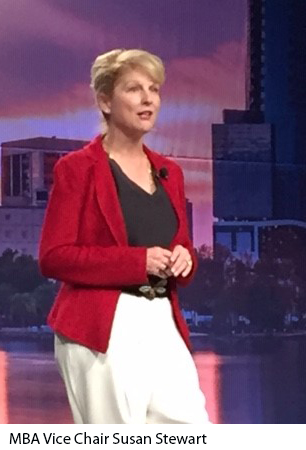
MBA Vice Chair: Servicers at ‘Front Lines’ with Customers
ORLANDO–Mortgage Bankers Association Vice Chair Susan Stewart said mortgage servicers’ relationships with their customers are more important than ever.
The mortgage industry is facing some serious headwinds,” Stewart said here at the MBA National Mortgage Servicing Conference & Expo. “After many years of expansion, we are now in a cycle that requires a reduction of the excess capacity in the market today. As an industry, we are challenged with maintaining and retaining a high level of customer service throughout the life of the loan, often during very difficult circumstances for borrowers.”
 Stewart is CEO of SWBC Mortgage Corp., San Antonio. She joined SWBC in 1989; under her leadership, it has grown from three to 615 employees, operating in 39 states with annual volume of $3 billion and a servicing portfolio exceeding $10 billion. She currently serves as a member of MBA’s Board of Directors and is the immediate past Vice-Chair of its Residential Board of Governors and also serves on the board of the MBA Opens Doors Foundation and on MBA’s Consumer Affairs Advisory Council.
Stewart is CEO of SWBC Mortgage Corp., San Antonio. She joined SWBC in 1989; under her leadership, it has grown from three to 615 employees, operating in 39 states with annual volume of $3 billion and a servicing portfolio exceeding $10 billion. She currently serves as a member of MBA’s Board of Directors and is the immediate past Vice-Chair of its Residential Board of Governors and also serves on the board of the MBA Opens Doors Foundation and on MBA’s Consumer Affairs Advisory Council.
Stewart said for SWBC, a mid-sized IMB that retains servicing, the challenges are easy to identify. “No matter the size of your business–large or small, we all have similar goals: Gain market share; manufacture more efficiently; and lower costs,” she said. “Certainly it will be a neat trick for all of us to gain market share. Lowering cost through improved processes is always good, but it will take additional investment in technology and some time.
Add to that the significant increase in servicing costs and the effort gets a bit more formidable. In the past nine years, the cost to service a performing loan has increased by 53%. Over the last 10 years, the cost to service a non-performing loan increased by 228%.
For Stewart, the solutions are simple: “We need reform; we must continue to improve technology; we need multiple easy ‘of the moment’ methods of communication,” she said. “For me and other CEOs focused on strategies for success in an evolving industry, we are open to change and persistently looking for ways to make your job easier and our customers happier.”
Stewart said the industry must move forward “We will find ways to lower costs across all lines of business while maintaining high service levels,” she said. “We will collaborate with technology providers to create better, more intuitive customer-facing technology tools easier for customers to self-serve for all types of transactions. We need to expand machine learning techniques, and explore all of the options blockchain has to offer the various parties to the transaction.”
To accomplish this, Stewart said, will require cooperation from participants and regulators. “We can make many of these internal changes, improve the process and perhaps–eventually–lower our cost to service,” she said. “But, we must also coordinate our efforts with investors, the FHA, VA, and our various third-party vendors and parties. Because in the end we have a collective goal–to serve our customers, demystify our processes and requirements, and, whenever possible, help people stay in their homes. This common objective provides the basis for our collaborative efforts.”
Lenders and servicers must do their part, Stewart said. “Let’s empower our employees and our customers with more education and information to bridge the gap between origination and servicing,” she said. “Originators need tools to provide borrowers with correct details. Methods to easily distribute information and assist borrowers in understanding not just loan terms, but escrow accounts, insurance claims, recast processes, and many other tasks that often create friction when not properly explained. Because setting the right expectations early on in the process, sets up the entire team for success.”
MBA is helping to drive the process, too, Stewart said. “We are working toward positive improvements and simplifications to the process that will help make your job easier. Collaboration between providers, all of you and our industry advocate–MBA–will allow us to create a new improved era for loan servicing. So I encourage you to continue working with MBA to fix the regulatory gap and align servicing standards. This will create a pathway for more efficient technologies that better serve our customers.”
